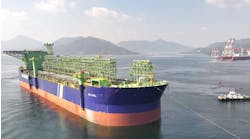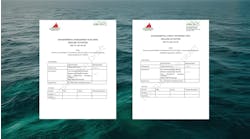Maintaining the competitiveness of the Norwegian ship owners, including those operating in the offshore sector, is one of the key issues facing the Norwegian Shipowners Association. The association hopes the process of harmonization of shipping taxes will lead to reducing Norwegian taxation to the European level.
The offshore service vessel sector is currently in a phase of both renewal and expansion, according to Ole Kristian Bærvahr, the association's director of international affairs and coordinator of its offshore service vessel group. The Norwegian-controlled fleet numbers 350 vessels, including supply boats, anchor handlers, and various kinds of support vessel. A further 39 newbuilds are on order, almost all of them under construction in Norwegian yards.
Backed by Norway's lengthy merchant marine tradition, owners have long been active abroad, and a Norwegian presence can be noted in areas such as the Brazilian, Australian, and West African offshore sectors, often in the form of joint ventures. A number of the larger companies derive more than half their offshore income from outside Norway, Bærvahr says.
However, owners face the disadvantage of less favorable financial and tax conditions than their counterparts in other countries. This situation could change as a result of moves in the European Union to harmonize shipping taxes. The process does not yet involve Norway, though as a member of the European Eco-nomic Agreement, the country is subject to EU shipping legislation. It would reduce the tax burden for Norwegian owners, and the association is optimistic that under the influence of the EU a more competitive framework will eventually be introduced.
null
The association would also welcome the end of shipbuilding subsidies on a global basis, Bærvahr says. Subsidies are seen as threatening the profitability of both shipyards and owners by encouraging an excessive volume of newbuilding. In line with the EU, Norway has abolished shipbuilding subsidies, but it is important in the association's view that Norwegian yards should work within the same framework as their European competitors.
One area in which the association would like to see continuing support is R&D. This is an important activity for the offshore service vessel sector, where there is a high level of innovation as new solutions are sought to enable tasks to be done more efficiently, economically, and safely, prompting changes in vessel design, engine properties, etc.
Norwegian owners have responded to the demand for advanced vessels from home and abroad, developing, for example, anchor-handlers capable of operating in the deep waters of Brazil. Supply vessels have also become highly sophisticated, as logistical demand has become more advanced.




